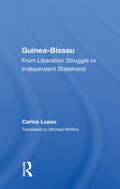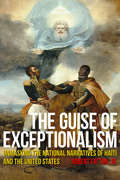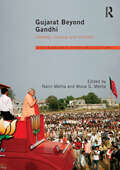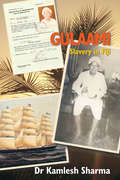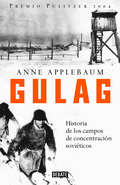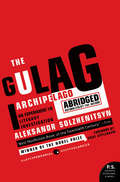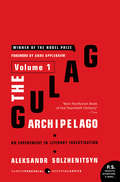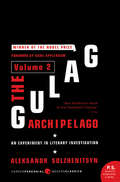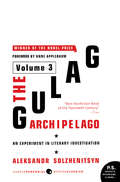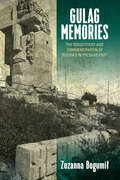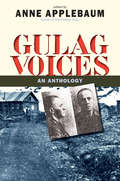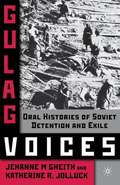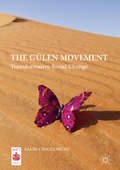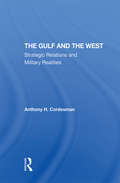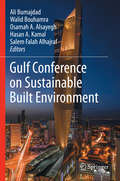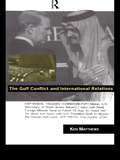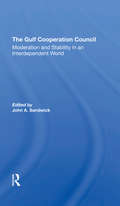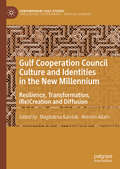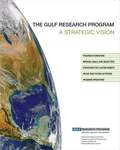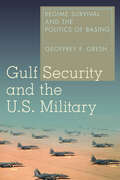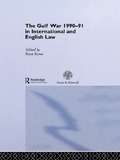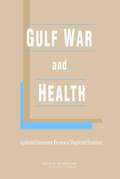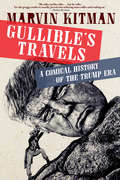- Table View
- List View
Guinea Bissau: From Liberation Struggle To Independent Statehood
by Carlos LopesThis book addresses whether Guinea-Bissau is a nation or a nation in formation; what the political and ideological foundations of the national liberation movement are; and how one should characterize the historical transition from a national liberation movement to a state.
The Guise of Exceptionalism: Unmasking the National Narratives of Haiti and the United States (Critical Caribbean Studies)
by Robert FattonThe Guise of Exceptionalism compares the historical origins of Haitian and American exceptionalisms. It also traces how exceptionalism as a narrative of uniqueness has shaped relations between the two countries from their early days of independence through the contemporary period. As a social invention, it changes over time, but always within the parameters of its original principles.
Gujarat Beyond Gandhi: Identity, Society and Conflict (Routledge South Asian History and Culture Series)
by Nalin Mehta Mona G. MehtaThe birthplace of Mahatma Gandhi and the land that produced Mohammad Ali Jinnah, the founder of Pakistan, Gujarat has been at the centre-stage of South Asia’s political iconography for more than a century. As Gujarat, created as a separate state in 1960, celebrates its golden jubilee this collection of essays critically explores the many paradoxes and complexities of modernity and politics in the state. The contributors provide much-needed insights into the dominant impulses of identity formation, cultural change, political mobilisation, religious movements and modes of communication that define modern Gujarat. This book touches upon a fascinating range of topics – the identity debates at the heart of the idea of modern Gujarat; the trajectory of Gujarati politics from the 1950s to the present day; bootlegging, the practice of corruption and public power; vegetarianism and violence; urban planning and the enabling infrastructure of antagonism; global diasporas and provincial politics – providing new insights into understanding the enigma of Gujarat. Going well beyond the boundaries of Gujarat and engaging with larger questions about democracy and diversity in India, this book will appeal to those interested in South Asian Studies, politics, sociology, history as well as the general reader. This book was published as a special issue of South Asian History and Culture.
The Gujarat Carnage
by Asghar Ali EngineerIn February 2002, 59 Hindu pilgrims were burnt alive in a rail coach at Godhra. The National Human Rights Commission investigated the episode. This is a compilation of reports, surveys, and other significant material on the carnage.
Gulaami: Indentured Labour - Fiji
by Dr Kamlesh SharmaGulaami documents the experiences of a Girmitiya (Indentured Labourer) in Fiji who is originally from the village of Devadeha in the district of Basti in Uttar Pradesh. The reinvented slave trade of the mid 1850s by the British resulted in the removal of hundreds of thousands of Indians from their motherland, India and transplanted against their wishes in the British colonies (including Fiji) across the globe. In the South Pacific setting, slavery in Fiji is a story of the forgotten stolen generation right in the backyard of countries such as Australia and New Zealand. The story of Gulaami is about the ancestors of the Fijiindians who sacrificed so much for the betterment of Fiji and the emergence of the Fijiindian society, who are still struggling for equality and justice in the only country that they have known since their birth, Fiji.
Gulag: Historia de los campos de concentración soviéticos (Annals Of Communism Ser.)
by Anne ApplebaumUna extensa y detallada historia del origen y el desarrollo de los Gulags soviéticos y su herencia hasta la actualidad. El Gulag aparece en la conciencia de occidente en 1977 con la publicación de la obra de Aleksandr Solzhenitsin Archipiélago Gulag. A partir de nuevos estudios, memorias publicadas tras la caída de la URSS y algunos archivos hasta ahora secretos, Anne Applebaum realiza una reconstrucción histórica del origen y la evolución de los campos de concentración soviéticos que devuelve este infausto e inolvidable episodio al centro de la tormentosa historia del convulso siglo XX. Con detalle y precisión asistimos a la vida cotidiana en el campo: las automutilaciones para evitar los trabajos forzados, las bodas entre prisioneros, la vida de las mujeres y los niños, las rebeliones y los intentos de fuga. El libro, documentado y riguroso, sostiene que el Gulag nació no solo por la necesidad de aislara los elementos que el Partido Comunista consideraba enemigos, sino para conseguir, al mismo tiempo, una masa de trabajadores-esclavos que trabajara a cambio de comida en inmensos proyectos como el canal del mar Blanco o las minas de Kolimá. Tras la descripción del horror organizado por el régimen soviético, el libro narra cómo Gorbachov, cuya familia se vio directamente afectada por esta política represiva, decidió terminar con este régimen carcelario liberando a la ciudadanía de uno de los más perversos y crueles sistemas represivos que el mundo ha conocido. Reseña:«El Gulag de Anne Applebaum es un libro importante. Sus muchos años de minuciosa investigación han provisto a la autora de un inmenso caudal de fascinantes detalles para recrear una terrible e inolvidable historia.»Anthony Beevor, autor de Stalingrado
Gulag
by Anne ApplebaumEl Gulag aparece en la conciencia de occidente en 1977 con la publicación de la obra de Aleksandr Solzhenitsin Archipiélago GULAG. A partir de nuevos estudios, memorias publicadas tras la caída de la URSS y algunos archivos hasta ahora secretos, Anne Applebaum realiza una reconstrucción histórica del origen y la evolución de los campos de concentración soviéticos que devuelve este infausto e inolvidable episodio al centro de la tormentosa historia del convulso siglo XX. Con detalle y precisión asistimos a la vida cotidiana en el campo: las automutilaciones para evitar los trabajos forzados, las bodas entre prisioneros, la vida de las mujeres y los niños, las rebeliones y los intentos de fuga. El libro, documentado y riguroso, sostiene que el Gulag nació no solo por la necesidad de aislar a los elementos que el Partido Comunista consideraba enemigos, sino para conseguir, al mismo tiempo, una masa de trabajadores-esclavos que trabajara a cambio de comida en inmensos proyectos como el canal del mar Blanco o las minas de Kolimá. Tras la descripción del horror organizado por el régimen soviético, el libro narra cómo Gorbachov, cuya familia se vio directamente afectada por esta política represiva, decidió terminar con este régimen carcelario liberando a la ciudadanía de uno de los más perversos y crueles sistemas represivos que el mundo ha conocido. «El Gulag de Anne Applebaum es un libro importante. Sus muchos años de minuciosa investigación han provisto a la autora de un inmenso caudal de fascinantes detalles para recrear una terrible e inolvidable historia.» ANTHONY BEEVOR, autor de Stalingrado
The Gulag Archipelago 1918-1956: An Experiment in Literary Investigation (P. S. Ser.)
by Aleksandr I. Solzhenitsyn“BEST NONFICTION BOOK OF THE 20TH CENTURY.” —Time“It is impossible to name a book that had a greater effect on the political and moral consciousness of the late twentieth century.” —David Remnick, The New YorkerThe Nobel Prize winner’s towering masterpiece of world literature, the searing record of four decades of terror and oppression, in one abridged volume (authorized by the author). Features a new foreword by Anne Applebaum.Drawing on his own experiences before, during and after his eleven years of incarceration and exile, on evidence provided by more than 200 fellow prisoners, and on Soviet archives, Solzhenitsyn reveals with torrential narrative and dramatic power the entire apparatus of Soviet repression, the state within the state that once ruled all-powerfully with its creation by Lenin in 1918. Through truly Shakespearean portraits of its victims-this man, that woman, that child-we encounter the secret police operations, the labor camps and prisons, the uprooting or extermination of whole populations, the “welcome” that awaited Russian soldiers who had been German prisoners of war. Yet we also witness astounding moral courage, the incorruptibility with which the occasional individual or a few scattered groups, all defenseless, endured brutality and degradation. And Solzhenitsyn’s genius has transmuted this grisly indictment into a literary miracle.“The greatest and most powerful single indictment of a political regime ever leveled in modern times.” —George F. Kennan“Solzhenitsyn’s masterpiece. . . . The Gulag Archipelago helped create the world we live in today.” —Anne Applebaum, Pulitzer Prize-winning author of Gulag: A History, from the foreword
The Gulag Archipelago Volume 1: An Experiment in Literary Investigation
by Aleksandr I. Solzhenitsyn“BEST NONFICTION BOOK OF THE 20TH CENTURY.” —TimeVolume 1 of the gripping epic masterpiece, Solzhenitsyn's chilling report of his arrest and interrogation, which exposed to the world the vast bureaucracy of secret police that haunted Soviet society. Features a new foreword by Anne Applebaum.“The greatest and most powerful single indictment of a political regime ever leveled in modern times.” —George F. Kennan“It is impossible to name a book that had a greater effect on the political and moral consciousness of the late twentieth century.” —David Remnick, The New Yorker“Solzhenitsyn’s masterpiece. . . . The Gulag Archipelago helped create the world we live in today.” —Anne Applebaum, Pulitzer Prize-winning author of Gulag: A History, from the foreword
The Gulag Archipelago Volume 2: An Experiment in Literary Investigation
by Aleksandr I. Solzhenitsyn“BEST NONFICTION BOOK OF THE 20TH CENTURY.” —TimeVolume 2 of the Nobel Prize-winner’s towering masterpiece: the story of Solzhenitsyn's entrance into the Soviet prison camps, where he would remain for nearly a decade. Features a new foreword by Anne Applebaum.“The greatest and most powerful single indictment of a political regime ever leveled in modern times.” —George F. Kennan“It is impossible to name a book that had a greater effect on the political and moral consciousness of the late twentieth century.” —David Remnick, The New Yorker“Solzhenitsyn’s masterpiece. . . . The Gulag Archipelago helped create the world we live in today.” —Anne Applebaum, Pulitzer Prize-winning author of Gulag: A History, from the foreword
The Gulag Archipelago Volume 3: An Experiment in Literary Investigation
by Aleksandr I. Solzhenitsyn“BEST NONFICTION BOOK OF THE 20TH CENTURY.” —Time <P><P>Volume 3 of the Nobel Prize winner’s towering masterpiece: Solzhenitsyn's moving account of resistance within the Soviet labor camps and his own release after eight years. Features a new foreword by Anne Applebaum. <P><P>“The greatest and most powerful single indictment of a political regime ever leveled in modern times.” —George F. Kennan <P><P>“It is impossible to name a book that had a greater effect on the political and moral consciousness of the late twentieth century.” —David Remnick, New Yorker <P><P>“Solzhenitsyn’s masterpiece. . . . The Gulag Archipelago helped create the world we live in today.” —Anne Applebaum, Pulitzer Prize-winning author of Gulag: A History, from the foreword
Gulag Memories: The Rediscovery and Commemoration of Russia's Repressive Past
by Zuzanna BogumiłThough the institution of the Gulag was nominally closed over half a decade ago, it lives on as an often hotly contested site of memory in the post-socialist era. This ethnographic study takes a holistic, comprehensive approach to understanding memories of the Gulag, and particularly the language of commemoration that surrounds it in present-day Russian society. It focuses on four regions of particular historical significance—the Solovetsky Islands, the Komi Republic, the Perm region, and Kolyma—to carefully explore how memories become a social phenomenon, how objects become heritage, and how the human need to create sites of memory has preserved the Gulag in specific ways today.
Gulag Voices
by Anne ApplebaumAnne Applebaum wields her considerable knowledge of a dark chapter in human history and presents a collection of the writings of survivors of the Gulag, the Soviet concentration camps. Although the opening of the Soviet archives to scholars has made it possible to write the history of this notorious concentration camp system, documents tell only one side of the story. Gulag Voicesnow fills in the other half. The backgrounds of the writers reflect the extraordinary diversity of the Gulag itself. Here are the personal stories of such figures as Dmitri Likhachev, a renowned literary scholar; Anatoly Marchenko, the son of illiterate laborers; and Alexander Dolgun, an American citizen. These remembrances--many of them appearing in English for the first time, each chosen for both literary and historical value--collectively spotlight the strange moral universe of the camps, as well as the relationships that prisoners had with one another, with their guards, and with professional criminals who lived beside them. A vital addition to the literature of this era,annotated for a generation that no longer remembers the Soviet Union,Gulag Voiceswill inform, interest, and inspire, offering a source for reflection on human nature itself.
Gulag Voices
by Jehanne M Gheith Katherine R. JolluckIn this volume, the powerful voices of Gulag survivors become accessible to English-speaking audiences for the first time through oral histories, rather than written memoirs. It brings together interviews with men and women, members of the working class and intelligentsia, people who live in the major cities and those from the "provinces," and from an array of corrective hard labor camps and prisons across the former Soviet Union. Its aims are threefold: 1) to give a sense of the range of the Gulag experience and its consequences for Russian society; 2) to make the Gulag relevant to English-speaking readers by offering comparisons to historical catastrophes they are likely to know more about, such as the Holocaust; and 3) to discuss issues of oral history and memory in the cultural context of Soviet and post-Soviet society.
The Gülen Movement: Transformative Social Change (Middle East Today)
by Salih CıngıllıoğluThis book presents findings from research into one of the world's most influential Islamic movements, the Gülen Movement, from the perspective of social transformation through adult education. At the core of research questions lies how the movement enrolls volunteers from all walks of life and transforms them to adopt its aims at the expense of their individual ideals. The book reveals the socio-psychological mechanisms that make such transformation possible by looking at how followers integrate weekly lectures and discussions on the theory and practice of Islam into their personal and social lives. The Gülen Movement offers a moderate interpretation of Islam and stresses the vitality of establishing communication with the members of all faiths. This book provides a window into how and why religion may roll into extremism by presenting findings from an opposite perspective: the participants in the research all define themselves as truly pious but do not even imply an act of violence in tens of hours of interviews. In short, the book weaves the strands of "Islamic," "movement," and "adult education" into a unified whole and limns the snapshot of a social movement, offering a comprehensive discussion of the role of adult education within the movement, as well as its transformative potential and its wider social and political implications.
The Gulf And The West: Strategic Relations And Military Realities
by Anthony H CordesmanThis book examines the military capabilities of various potential threats, the capabilities of Saudi Arabia and other friendly Gulf states, and the capabilities of Western power projection forces.
Gulf Conference on Sustainable Built Environment
by Ali Bumajdad Walid Bouhamra Osamah A. Alsayegh Hasan A. Kamal Salem Falah AlhajrafThis volume brings together outstanding contributions to the Gulf Conference on Sustainable Built Environment, held at the Marina Hotel Kuwait, near Kuwait City. The Proceedings collects 29 papers on a range of engineering and materials challenges, and best practices, addressing development of new sustainable building materials, performance improvement of structures and tall buildings, developing monitoring and analysis techniques and frameworks for existing infrastructure under environmental effects, development of long-term sustainability plans for building stock, and development of energy efficient buildings in the gulf region. The Conference was organized by the Kuwait Foundation for the Advancement of Sciences (KFAS), the Massachusetts Institute of Technology, the Kuwait Institute for Scientific Research, and Kuwait University.
The Gulf Conflict and International Relations
by Ken MatthewsThis book provides a comprehensive analysis and review of the major events and the leading actors of the Gulf War. Copies of key documents and essential factual information build up a picture of the realities of war in the Middle East but the material is set in a strong theoretical framework. This allows the author to see the conflict within the context of the international system and to relate it to the changes of the post-cold-war world. Matthews looks at the shifts in international order which dictated the nature of the international response to the war, but also at the new conditions created by the war itself. What scope is there for Arab socialism after the fall of European socialism? Has the conflict made Israel stronger or weaker? Can the UN be entrusted with the post of global peace-keeper?
The Gulf Cooperation Council: Moderation And Stability In An Interdependent World
by John A. SandwickThe Gulf Cooperation Council represents both a model of development and unity in the Arab world and a working example of interstate cooperation to other nations. In this volume, contributors describe the rationale for Gulf unity and cooperation and analyze the financial, economic, and legal institutions of the GCC member states (Saudi Arabia, Kuwait, the United Arab Emirates, Oman, Bahrain, and Qatar). They focus on the GCC's role in maintaining stability in the Arabian peninsula, an area that is clearly vital to U.S. interests. Contributors pinpoint the essential elements of GCC unity, including its efforts to obtain optimum economic self-sufficiency, to maximize market share and revenue from oil production, and to establish an integrated legal framework. The GCC's unique security needs, given the member states' vast combined area and thinly spread populations, are also discussed. An overview of the strategic interests and policies of both superpowers toward the region reveals a history of decline in their influence and prestige that is a result, it is argued, of misperceptions and misguided policies. Finally, documentation and bibliographic sections enhance the book's usefulness as a handbook on the GCC and the Arabian Gulf states.
Gulf Cooperation Council Culture and Identities in the New Millennium: Resilience, Transformation, (Re)Creation and Diffusion (Contemporary Gulf Studies)
by Nermin Allam Magdalena KarolakThe book analyzes recent changes to the identities and cultures of the GCC countries. These important transformations have gone largely unnoticed due to the fast-paced changes in the region that affect all aspects of society. The volume unpacks these transformations by looking from a holistic perspective at the intersections of language, arts, education, political culture, city, regional alliances and transnational identities. It offers selected case studies based on original research carried out in the region. Chapter 7, ‘Identity Lost & Found: Architecture and Identity Formation in Kuwait and the Gulf’, of this book is available open access under a CC BY 4.0 license at link.springer.com
Gulf Research Program: A Strategic Vision
by Advisory GroupIn 2010 the Deepwater Horizon explosion and fire in the Gulf of Mexico caused the largest offshore oil spill in U. S. history, resulting in significant impacts on the region\'s environment and residents. Legal settlements with the companies held responsible led the federal government to ask the National Academy of Sciences to form and administer a 30-year program to enhance oil system safety, human health, and environmental resources in the Gulf of Mexico and other U. S. continental shelf areas where offshore oil and gas exploration and production occur or are under consideration. The new Gulf Research Program will receive $500 million to support activities using three broad approaches: research and development, education and training, and environmental monitoring. The Gulf Research Program: A Strategic Vision establishes the Program\'s foundation and introduces its mission, goals, and objectives. It describes some initial activities and sets out the Program\'s vision for contributing lasting benefit to the Gulf region and the nation. The Program is an extraordinary opportunity to foster science on a regional scale and over the long term. The document will be of interest to scientists, health professionals, engineers, and educators who wish to learn about, collaborate with, and submit proposals to the Program, and to all those who share the goal of enhancing resilience in areas where offshore energy production, vibrant communities, and dynamic ecosystems coexist.
Gulf Security and the U.S. Military: Regime Survival and the Politics of Basing
by Geoffrey F. GreshThe U. S. military maintains a significant presence across the Arabian Peninsula but it must now confront a new and emerging dynamic as most Gulf Cooperation Council countries have begun to diversify their political, economic, and security partnerships with countries other than the United States--with many turning to ascending powers such as China, Russia, and India. For Gulf Arab monarchies, the choice of security partner is made more complicated by increased domestic and regional instability stemming in part from Iraq, Syria, and a menacing Iran: factors that threaten to alter totally the Gulf's current security dynamic. Understanding the dynamics of base politicization in a Gulf host nation--or any other--is therefore vitally important for the U. S. today. Gulf National Security and the U. S. Military examines both Gulf Arab national security and U. S. military basing relations with Gulf Arab monarchy hosts from the Second World War to the present day. Three in-depth country cases--Saudi Arabia, Bahrain, and Oman--help explain the important questions posed by the author regarding when and why a host nation either terminated a U. S. military basing presence or granted U. S. military basing access. The analysis of the cases offers a fresh perspective on how the United States has adapted to sometimes rapidly shifting regional security dynamics and factors that influence a host nation's preference for eviction or renegotiation, based on its perception of internal versus external threats.
The Gulf War 1990-91 in International and English Law
by Peter RoweThere is no doubt that international law was of major importance during the Gulf conflict of 1990-91. Military and other actions were repeatedly justified through reference to international law, and disputes about interpretation were frequent. This book provides a definitive legal analysis of the conflict, with reference both to international and to English law. Some have been tempted to argue that international law is an ineffective means of controlling the activities of a state and its armed forces from the fact that there were no war crimes trials of the leaders of Iraq, or of any other state. International law does, however, provide a set of norms either (a) agreed to by individual states through the ratification of, or accession to, a treaty, or (b) which apply to all states by the operation of customary international law and other secondary sources. This book determines these norms in order to judge the manner in which individual states recognized the binding nature of them in the conduct of their operations. The contributors include lawyers from each of the three British armed services.
GULF WAR and HEALTH: UPDATED LITERATURE REVIEW OF DEPLETED URANIUM
by Institute of Medicine of the National AcademiesThe 1991 Persian Gulf War was considered a brief and successful military operation with few injuries and deaths. A large number of returning veterans, however, soon began reporting health problems that they believed to be associated with their service in the gulf. Under a Congressional mandate, the Institute of Medicine (IOM) is reviewing a wide array of biologic, chemical, and physical agents to determine if exposure to these agents may be responsible for the veterans' health problems. In a 2000 report, Gulf War and Health, Volume 1: Depleted Uranium, Sarin, Pyridostigmine Bromide, and Vaccines, the IOM concluded that there was not enough evidence to draw conclusions as to whether long-term health problems are associated with exposure to depleted uranium, a component of some military munitions and armor. In response to veterans' ongoing concerns and recent publications in the literature, IOM updated its 2000 report. In this most recent report, Gulf War and Health: Updated Literature Review of Depleted Uranium, the committee concluded that there is still not enough evidence to determine whether exposure to depleted uranium is associated with long-term health problems. The report was sponsored by the U.S. Department of Veterans Affairs.
Gullible's Travels: A Comical History of the Trump Era
by Marvin KitmanHow to have fun hating TrumpKitman describes the land of Gulliblesylvania as a democratic country ruled by 34.9 % of the people, "a minority better known as 'the base,' of whom a candidate said he could shoot someone on Fifth Avenue and they would still vote for him." At first Kitman assumed that Trump's candidacy was a publicity stunt. After he realized it was serious, as a satirist he felt very lucky and began to keep a comical journal, modeled after A Journal of the Plague Year which Daniel Defoe described as "Observations of the most remarkable occurrence, which happened in London during the last great visitation in 1665"--which is not to compare the Trump administration to the bubonic plague, Kitman hastens to add. "For one thing, as our POTUS has been telling us, he's made America Great again--AND IT ONLY TOOK A YEAR AND A HALF!" Kitman adds, "And I have never before had such a good time observing and writing about the follies of our country."Gullibles Travels includes 32 "Trumponicles; the debate over the president's intellectual capacity; "That Russian Thing;" "Who is Agent Orange"; and a CODA that asks the question, "How Will It All End?" Impeachment? 25th Amendment sacking? Resignation? Or reelection?
